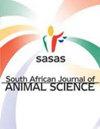Feeding Nigella sativa oil to broilers affects their performance, serum constituents and cecum microbiota
IF 0.6
4区 农林科学
Q3 AGRICULTURE, DAIRY & ANIMAL SCIENCE
引用次数: 1
Abstract
The objective of this study was to assess the effect of supplementation of Nigella sativa oil (NSO) as a growth promoter in broiler diets. A total of 300 unsexed one-day-old Arbor Acre broiler chicks were randomly divided into five treatment groups (60 chicks/group). Each group was divided into five replicates with 12 chicks per replicate. Group 1 was fed on the basal diet with no additives (control). Group 2 was fed the basal diet supplemented with oxytetracycline (OTC) at the level of 50 ppm. Groups 3, 4 and 5 were fed the basal diet supplemented with 500, 1000 and 1500 ppm NSO, respectively. Birds fed on 1500 ppm NSO diet showed the heaviest body weight at 14, 28 and 42 days of age. Feed conversion ratio was significantly improved at all ages with the inclusions of OTC and NSO generally superior to the control group. The relative weight of spleen was increased significantly by the addition of NSO at various levels. However, relative weights of thymus and bursa were not altered by the treatments. Total bacterial count, total yeast and moulds count, E. coli and salmonella spp. counts were reduced significantly, whereas the total lactic acid bacteria count was increased in OTC and NSO groups compared with control. Nigella sativa oil could be used in broiler chicken feeds as a natural alternative to antibiotic growth promoters to improve gut health and consequently growth performance.肉鸡饲用黑油对肉鸡生产性能、血清成分和盲肠菌群均有影响
本研究的目的是评估在肉鸡饲粮中添加黑草油(NSO)作为生长促进剂的效果。选取300只1日龄爱拔益加肉仔鸡,随机分为5个处理组(每组60只)。每组分为5个重复,每个重复12只鸡。1组饲喂基础饲粮,不添加任何添加剂(对照组)。2组饲喂在基础饲粮中添加50 ppm土霉素(OTC)的试验饲粮。3、4、5组分别饲喂在基础饲粮中添加500、1000、1500 ppm NSO的试验饲粮。饲粮中添加1500 ppm NSO的雏鸟在14、28和42日龄体重最重。各年龄段的饲料系数均显著提高,OTC和NSO的添加均优于对照组。添加不同水平的NSO均显著提高了脾脏的相对重量。然而,胸腺和滑囊的相对重量未因处理而改变。与对照组相比,OTC组和NSO组的细菌总数、酵母菌总数、霉菌总数、大肠杆菌和沙门氏菌总数显著降低,而乳酸菌总数则显著增加。黑皮油可作为抗生素生长促进剂的天然替代品,用于肉鸡饲料中,改善肠道健康,提高生长性能。
本文章由计算机程序翻译,如有差异,请以英文原文为准。
求助全文
约1分钟内获得全文
求助全文
来源期刊

South African Journal of Animal Science
农林科学-奶制品与动物科学
CiteScore
1.50
自引率
0.00%
发文量
39
审稿时长
>36 weeks
期刊介绍:
The South African Journal of Animal Science is an open access, peer-reviewed journal for
publication of original scientific articles and reviews in the field of animal science. The journal
publishes reports of research dealing with production of farmed animal species (cattle, sheep,
goats, pigs, horses, poultry and ostriches), as well as pertinent aspects of research on aquatic
and wildlife species. Disciplines covered nutrition, genetics, physiology, and production
systems. Systematic research on animal products, behaviour, and welfare are also invited.
Rigorous testing of well-specified hypotheses is expected.
 求助内容:
求助内容: 应助结果提醒方式:
应助结果提醒方式:


